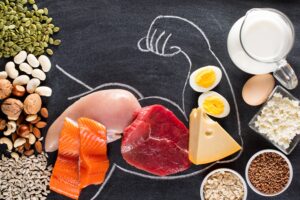Why is gut health linked to our mental state?
An unhealthy gut may lower your mood and productivity. This is because more than 30 different neurotransmitters and hormones including serotonin, the feel-good hormone, come partially from your gut. Therefore, small imbalances can have big implications for our mental state, and can often fluctuate daily. Luckily, there are many ways we can help our mental performance through diet. Read on to find out what to eat to benefit your gut-brain connection.
So, how are the gut and brain connected?
Some go so far as to call the gut our second brain. Communication between the gut and brain happens via signalling in the central nervous system. The vagus nerve is one of the biggest nerves connecting your gut and brain, it sends signals in both directions. This may not come as a surprise to learn; you may recall emotional states such as anger, sadness and happiness affecting feelings in your gut, and you might resonate with the expression ‘butterflies in your stomach’. The gut also prepares for the digestion of food simply by our brains instructing it to do so. Such information is important to consider in terms of nutrition because, depending on what you eat, you can tap into your biology, and fuel your brain power and energy levels, naturally!
Gut-brain axis, diet and productivity
As we mentioned earlier, the gut is a factory for neurotransmitters and hormones, here lies a clue to its role in productivity. Certain molecules in the food we eat are used by bacteria, which convert them into powerful chemicals contributing to our productivity.
Tryptophan: Tryptophan, as well as aiding in sleep can also improve our clarity of thought and alertness. It’s present in foods such as turkey, eggs, almonds, chia seeds and cheese. It can also be converted to serotonin, a happiness hormone.
Tyrosine: Tyrosine is known to fuel our initiative and adrenaline to give us that get up and go feeling. It is also converted to dopamine, which makes us happy and more productive. You can find it in almonds and lentils.
Lactic Acid: Lactic acid is naturally found in fermented foods such as kimchi. It has a great antioxidant action and offers protection to our circulatory system and brain. Antioxidants help with inflammation, which is often caused by overworking and stress.
The gut-brain connection, evidence for other beneficial foods
The Mediterranean diet is currently being studied for its brain-boosting potential. It contains many great components, with a focus mainly on high fruit and vegetable intake, legumes, nuts, beans, oily fish and plenty of olive oil.
- Omega 3 fats from oily fish are also found in high quantities in the human brain. Studies show omega 3 fatty acids increase good bacteria in the gut.
- Polyphenol-rich foods include cocoa, green tea, olive oil and coffee. These plant chemicals are digested by gut bacteria which boost beneficial strains and, in so doing, may improve cognition.
- High-fibre foods: Likewise, foods containing high amounts of fibre such as nuts, seeds, fruits and vegetables can all feed good gut bacteria and reduce stress hormones in humans.
What to avoid
Food additives including emulsifiers, artificial sweeteners, colours and preservatives interact with the bacteria in the gut, leading to an alteration in brain functioning and behavioural patterns. The consumption of processed foods has been found to decrease the production of a brain-derived molecule known as neurotrophic factor (BDNF). This molecule is responsible for promoting long-term memory, facilitating learning, and supporting the growth of new brain cells.
- Artificial sweeteners (namely aspartame) tend to be made with chemicals and ingredients such as phenylalanine that have been linked to behavioural and cognitive issues.
- Hydrogenated oils (also known as trans fats). Trans fats are linked to reduced memory and cognitive decline and can have detrimental effects on brain health, examples include deep fried food, chips, crisps and baked goods such as pastries.
The takeaways
Nutrition plays a crucial role in maintaining optimal brain health and cognitive function. Consuming a diverse range of colourful fruits and vegetables, along with fresh herbs and other healthy foods like almonds, oily fish and olive oil can help to provide the nutrients and antioxidants needed to support brain function.




